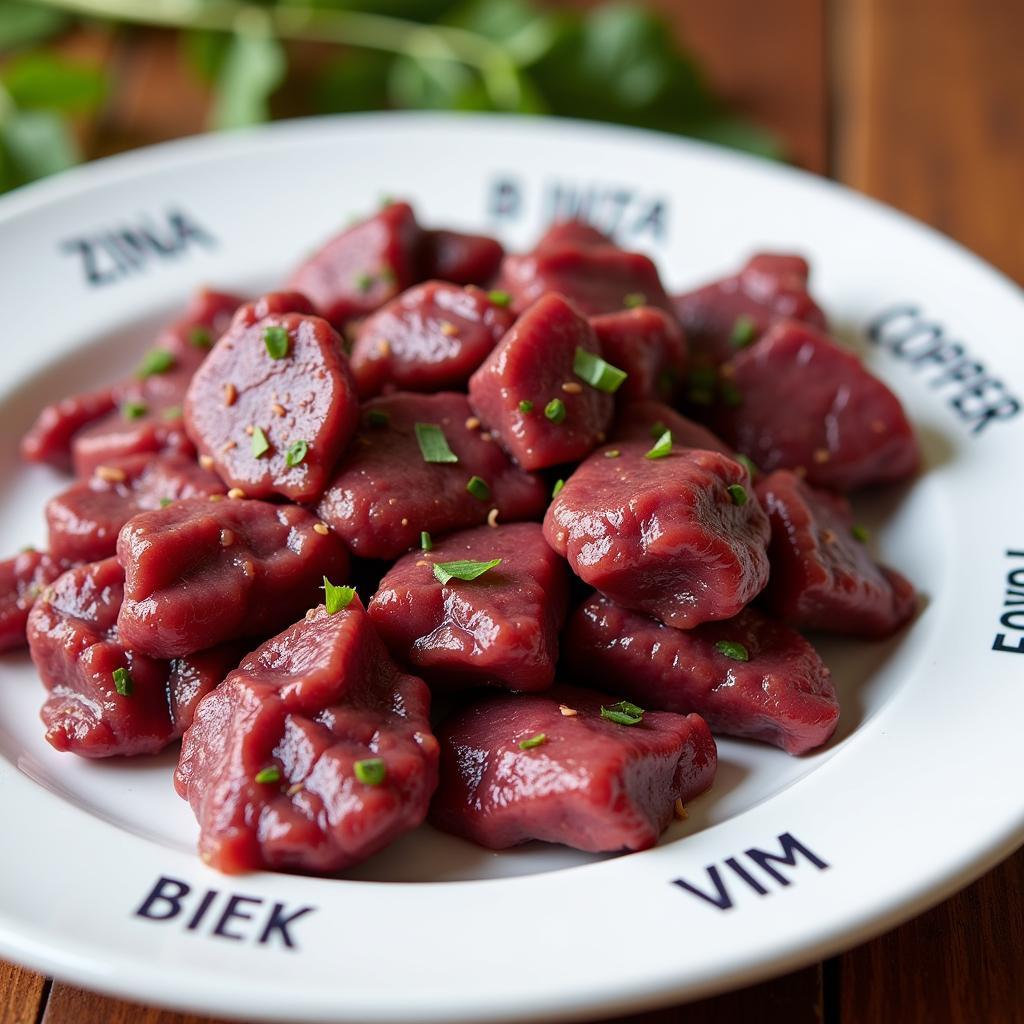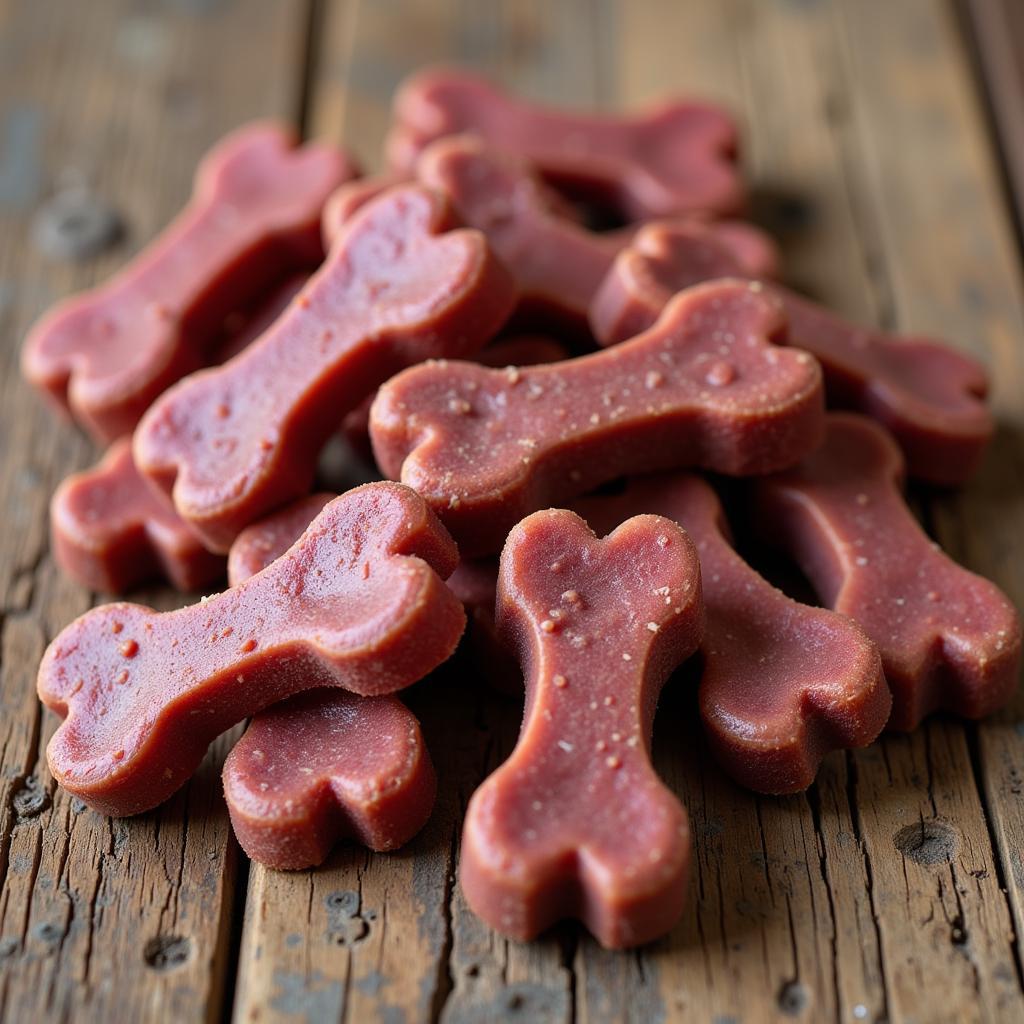Beef liver is a nutritional powerhouse that can offer a range of benefits for dogs. Rich in vitamins, minerals, and essential amino acids, this organ meat can be a valuable addition to a balanced canine diet.
Unlocking the Nutritional Benefits of Beef Liver for Dogs
While often overlooked, beef liver for dogs is a concentrated source of essential nutrients that can contribute to their overall health and well-being.
A Vitamin and Mineral Powerhouse
Beef liver is packed with essential vitamins and minerals, including:
- Vitamin A: Crucial for vision, immune function, and cell growth.
- B Vitamins: Important for energy metabolism, nerve function, and red blood cell production.
- Iron: Essential for oxygen transport in the blood.
- Copper: Contributes to iron absorption, collagen formation, and a healthy nervous system.
- Zinc: Supports immune function, wound healing, and cell growth.
 Beef Liver Nutrients
Beef Liver Nutrients
High-Quality Protein and Amino Acids
Beef liver is a highly digestible protein source, providing the building blocks for strong muscles, healthy tissues, and a shiny coat. It is also rich in essential amino acids, which dogs need to obtain from their diet.
Delicious and Appealing Taste
Many dogs find the rich, savory flavor of beef liver irresistible, making it an excellent addition to meals for picky eaters or those needing a boost in appetite.
Incorporating Beef Liver into Your Dog’s Diet
Beef liver, while nutritious, should be fed in moderation as part of a balanced diet. Here are some ways to safely incorporate it:
- Cooked: Lightly cook beef liver to eliminate potential bacteria and make it easier to digest. Avoid overcooking, as this can reduce nutrient availability.
- Raw: Some pet owners choose to feed raw beef liver as part of a raw food diet. It is crucial to source raw meat from reputable suppliers and handle it with proper hygiene to minimize risks.
- Freeze-Dried Treats: Freeze-dried beef liver treats offer a convenient and shelf-stable way to provide the benefits of this organ meat.
 Beef Liver Dog Treats
Beef Liver Dog Treats
Important Note: It’s always best to consult with your veterinarian before introducing new foods or making significant changes to your dog’s diet. They can advise on appropriate portion sizes and address any specific dietary needs or concerns.
Choosing the Right Beef Liver for Your Dog
- Source: Opt for beef liver from grass-fed, pasture-raised cows whenever possible. These animals are typically raised without hormones or antibiotics, resulting in a higher-quality product.
- Freshness: Choose fresh beef liver that has a deep red color and a mild scent. Avoid liver that appears discolored, has a strong odor, or shows signs of freezer burn.
- Preparation: Thoroughly wash beef liver before cooking or feeding it raw.
Potential Considerations and Precautions
While beef liver offers numerous benefits, there are a few things to keep in mind:
- Vitamin A Toxicity: While Vitamin A is essential, excessive intake can be harmful. It’s important to feed beef liver in moderation and avoid over-supplementing with Vitamin A.
- Allergies: Some dogs may be allergic to beef or other ingredients in beef liver treats or supplements. Introduce it gradually and watch for any signs of an allergic reaction, such as itching, digestive upset, or swelling.
Beef Liver Dog Food: A Nutritious Addition to a Balanced Diet
Beef liver can be a valuable addition to your dog’s diet, providing a concentrated source of essential nutrients and a flavor they’ll love. By following the guidelines above and working with your veterinarian, you can help ensure that your canine companion reaps the benefits of this nutritional powerhouse.
FAQs about Beef Liver for Dogs
1. Can puppies eat beef liver?
Yes, puppies can benefit from the nutrients in beef liver, but it should be introduced gradually and in appropriate portions as part of a balanced diet.
2. Is beef liver good for dogs with allergies?
While beef liver itself is not a common allergen, some dogs may be allergic to beef. Always introduce new foods gradually and watch for any signs of an allergic reaction.
3. How much beef liver can I give my dog?
The appropriate amount of beef liver will vary depending on your dog’s size, age, activity level, and overall diet. It’s best to consult with your veterinarian for personalized guidance.
4. Can I give my dog raw beef liver?
Feeding raw meat, including beef liver, comes with inherent risks. If you choose to feed raw, ensure the meat is sourced from a reputable supplier and handle it with proper hygiene.
5. What are the signs of Vitamin A toxicity in dogs?
Signs of Vitamin A toxicity can include bone and joint pain, loss of appetite, lethargy, and digestive issues. If you notice any of these symptoms, contact your veterinarian immediately.
Looking for More Dog Food Options?
For more information on dog nutrition and other healthy food choices for your furry friend, check out:
At Mina Cones Food, we’re committed to providing insightful information to help you make informed decisions about your dog’s nutrition. Contact us at 02437655121, email us at [email protected], or visit us at 3PGH+8R9, ĐT70A, thôn Trung, Bắc Từ Liêm, Hà Nội, Việt Nam for personalized support. Our dedicated customer care team is available 24/7 to assist you.